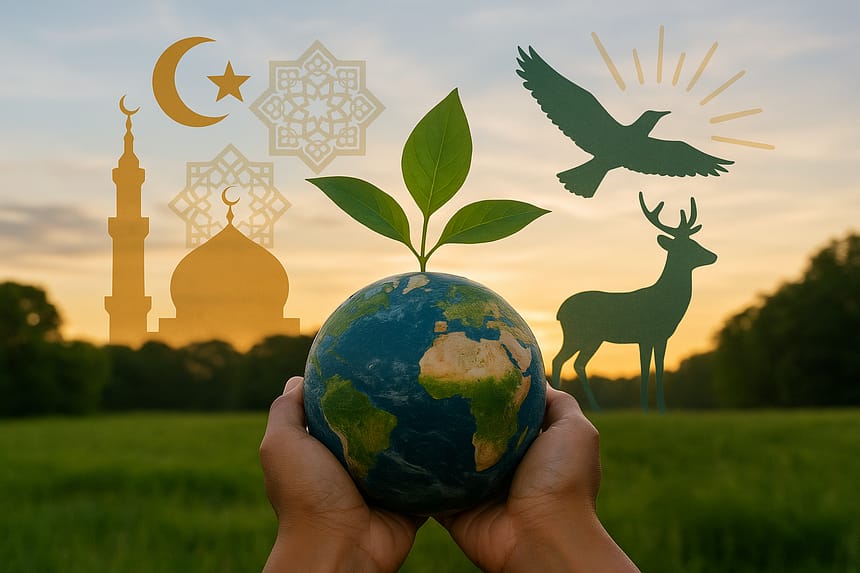Muslims need to look no further than the Quran for guidance, where there are approximately 200 verses concerning the environment.
— Ibrahim Ozdemir
When asked about Islam’s perspective on conserving natural resources, one might first think of an eager student meticulously defining key terms before going into an argument. It’s true that clarity often demands precision: terms like Islam, conservation, and natural resources carry nuanced meanings and must first be plainly established. Yet, unlike a secondary school debate, this exercise isn’t a competition for points. Rather, the intention here is subtler: to illuminate a neglected intersection, that Islam, often overlooked in this context, might indeed offer profound insights into environmental stewardship.
Islam, the youngest among the major Abrahamic faiths, is commonly identified as the religion founded approximately fourteen centuries ago, centred upon the Qur’an and the teachings of the Prophet Muhammad (peace be upon him). Today, its nearly two billion adherents, known collectively as the Ummah, consider Islam not merely a religion but a comprehensive way of life (deen) that encapsulates the entirety of human existence. They believe that Islam is the complete and final version of a primordial faith once revealed through earlier prophets: Adam, Noah, Abraham, Moses, and Jesus.
Conservation, by contrast, is a term flexible enough to shift meanings across contexts. Its definition in physics varies widely from its use in the arts or humanities. Here, we speak specifically of conservation as it relates to natural resources—the careful protection, management, and thoughtful use of nature’s tangible and intangible offerings, aimed at benefiting present and future generations. This includes forests, wildlife, land, water, and sunlight, among others.
But what precisely does Islam say about conserving these resources?
Though the Qur’an might not explicitly instruct believers with contemporary language such as “conserve your forests” or directly threaten environmental negligence with hellfire, the scripture and prophetic traditions clearly emphasise the principle of stewardship—khilafah. In Surah Yunus (10:14), the Qur’an declares: “Then we made you trustees (Khalifa) on the earth after them, to see how you would act.” Similar sentiments echo through other verses, such as Surah Al-Ahzab (33:72) and Surah Al-An’am (6:165). Complementing this, Prophet Muhammad succinctly captured humanity’s custodial responsibility: “The world is beautiful and verdant, and verily, God, The Exalted, has made you His stewards, and He observes how you acquit yourselves” (Sahih Muslim).
Muhammad A. Chakaki, a distinguished environmental consultant and co-founder of the American Green Muslims, underscores the gravity of this stewardship. “Being Khalifa—trustee or steward—does not grant humans absolute dominion over nature,” he explains. “Instead, it is a profound responsibility, an amana.” Indeed, Surah Al-Ahzab poignantly describes how this responsibility was once offered to the heavens, earth, and mountains, all of whom declined, recognising its immense weight. Only humankind, despite its propensity for injustice and foolishness, accepted it.
This tension between privilege and accountability resonates deeply in Islamic thought. While humans have permission to utilise natural resources, Islam explicitly condemns extravagance (israf), framing stewardship as both an honour and an ongoing test.
Echoing this ethos is Seyyed Hossein Nasr, the esteemed philosopher and professor of Islamic Studies at George Washington University. At over ninety years of age, Nasr remains a luminous voice advocating for the “resacralization of nature”—the urgent call to reconnect spiritual reverence with environmental consciousness. According to Nasr, the modern environmental crisis can never be fully understood, let alone resolved, without recognising its spiritual dimensions. Humankind, he argues compellingly in works such as “Religion and the Order of Nature,” must abandon its domineering, exploitative posture towards nature and instead embrace humility and reverence.
Predictably, Nasr’s approach is often dismissed as excessively spiritual or insufficiently scientific, particularly in an era fixated on technological solutions. Yet, the fundamental truth underlying his argument—that humanity’s environmental crisis is largely self-inflicted—remains widely accepted. This view resonates strongly with Qur’anic wisdom in Surah Ash-Shura (42:30): “And whatever misfortune befalls you, it is because of what your own hands have earned.”
Influenced by Nasr’s perspective, Ibrahim Ozdemir, a renowned environmentalist and philosophy professor at Turkey’s Uskudar University, proposes a radical simplicity in addressing the ecological crisis: “Islam teaches its followers to care for the Earth.” Ozdemir asserts that interpreting environmental issues through an Islamic lens might offer a potent yet frequently overlooked pathway toward resolution.
In the future, Islamic conservation practices such as Hima (protected areas), Waqf (endowment), and the principle of Israf (prohibition of wastefulness) will be explored in greater depth. For now, acknowledging climate change and its environmental ramifications is vital. In Surah Ar-Ra’ad (13:11), the Qur’an offers enduring wisdom: “…Verily, Allah does not change the condition of a people unless they change what is in themselves.” Thus, a sustainable future may indeed depend upon transforming how we view our sacred responsibility toward the Earth—a transformation deeply rooted in the principles and profound teachings of Islam.








